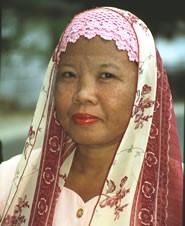Lampung Pesisir in Indonesia

Photo Source:
Copyrighted © 2026
Create International All rights reserved. Used with permission |
Send Joshua Project a map of this people group.
|
| People Name: | Lampung Pesisir |
| Country: | Indonesia |
| 10/40 Window: | Yes |
| Population: | 592,000 |
| World Population: | 592,000 |
| Primary Language: | Lampung Api |
| Primary Religion: | Islam |
| Christian Adherents: | 0.11 % |
| Evangelicals: | 0.01 % |
| Scripture: | New Testament |
| Ministry Resources: | Yes |
| Jesus Film: | Yes |
| Audio Recordings: | Yes |
| People Cluster: | Lampung of Sumatra |
| Affinity Bloc: | Malay Peoples |
| Progress Level: |
|
Introduction / History
The indigenous people who live primarily along the coastline of Lampung province are called the Lampung Pesisir (Coastal Lampung), or also sometimes the Lampung Peminggir (peminggir has the connotation of "outskirts"). They consist of four subgroups: 1) Peminggir Melinting Rajabasa in Labuhan Meringgai and around Rajabasa Kalianda area; 2) Peminggir Teluk in Teluk Betung area; 3) Peminggir Skala Brak in Liwa, Kenali, Pesisir Tengah, Pesisir Utara and Pesisir Selatan area; 4) Peminggir Semangka in Cukuh Balak, Talangpadang, Kotaagung and Wonosobo area. They speak a dialect of the Lampung Api language. The word api means "what?". There are two lines of cultural tradition within Lampung, namely Pepadun and Saibatin (which means "one leader"). Each subgroup of Lampung Pesisir has only one autonomous leader - a Prince or Sultan.
What Are Their Lives Like?
Most of the Lampung Pesisir work as farmers. Although they live on the seashore, very few work as fishermen. Lampung Pesisir homes have already begun to shift from the traditional, long elevated wooden homes built on thick poles to the concrete homes built at ground level typically found throughout Indonesia. Family structure for the Pesisir is still very strong with many regulations and formal relationship obligations. The definition of a family for the Pesisir has in view a large family made up of a father, a mother, children and grandchildren. The father is the leader of the home. The Lampung Pesisir are fairly open to interacting socially with outsiders. There are some who say that they would even adopt a child from another people group because they like to have large families. One of their life principles is Piil Pesenggiri, or "status/prestige must be guarded above all else." They generally live very simply, but they also enjoy receiving praise or recognition. They are not afraid to put out a lot of money for cultural festivals. They also often use prestige titles; for example, after marriage, men receive the title Adok and women receive the title Inai.
What Are Their Beliefs?
The Lampung Pesisir are followers of Sunni Shafi'I Islam. Even so, some people believe that certain graves and other spots are sacred places and hold magical powers, like the well at Pitu. Some people also place certain symbols, like a cross mark made using lime chalk, above their doors, windows and gates. They believe that these symbols can scare away evil spirits. For example, these symbols are especially used when a woman in the home is in late-term pregnancy, in order to chase away spirits called kuntilanak (a female zombie-like creature believed to be a woman who died in childbirth). There are a few Lampung Pesisir who have become Christians. Most of their extended families treat them harshly and attempt to deter them from converting. If they do convert, their families will continually try to get them return to Islam. After a while, they usually are accepted by the family again even though they are Christians.
What Are Their Needs?
Opportunities for education and work are the greatest needs for the Lampung Pesisir people. They also need to be better prepared to enter the industrial era, especially to have a desire to make themselves competitive and to be able to live among a diverse population. More than ninety percent of the Pesisir population lives off of rice farming, although they primarily live along the coast. Training in wise use of marine resources would be very useful to improve their economic situation.
Prayer Points
Pray for God's divine intervention in this community to know and accept Christ as their Lord.
Pray for God to soften their hearts and to know that Jesus is the way, the truth and the life.
Pray for more Christian communities to grow in their location to show them the blessings of a Christ-centered life.
Pray for the Lord to send dreams of the risen and victorious Christ to their elders.